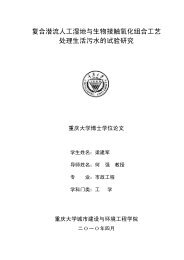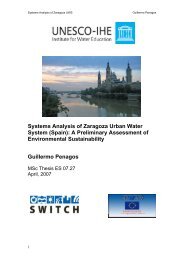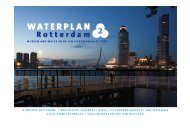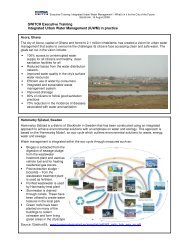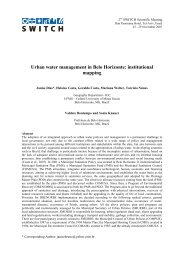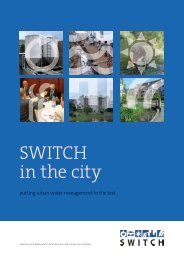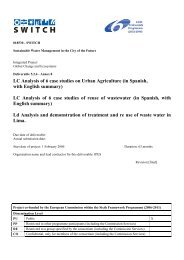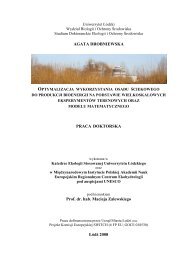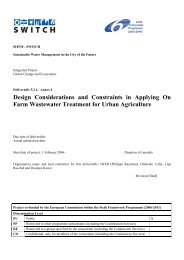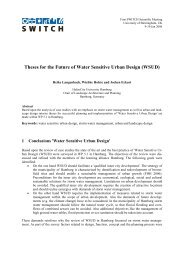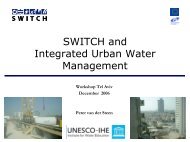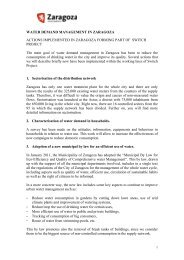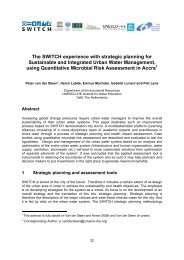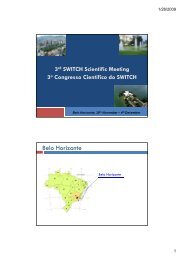Good practices for Social inclusion - Case studies and summary
Good practices for Social inclusion - Case studies and summary
Good practices for Social inclusion - Case studies and summary
Create successful ePaper yourself
Turn your PDF publications into a flip-book with our unique Google optimized e-Paper software.
Executive Summary<br />
The Basic Urban Services project in Colombo (Sri Lanka) aimed to improve low-income<br />
urban sanitation through multi-stakeholder involvement at local, municipal <strong>and</strong> agency level.<br />
The project covered Kotte Municipal Council <strong>and</strong> Wattala Urban Council areas. In Kotte the<br />
focus was on developing <strong>and</strong> pilot testing an integrated solid waste management strategy. In<br />
Wattala (in the slum Oliyamulla) the project addressed both innovative community-based<br />
solid waste management panning <strong>and</strong> field-testing, <strong>and</strong> wastewater management in a floodprone,<br />
waterlogged area. At Oliyamulla community level a Community Development<br />
Council was established to facilitate the community voice to be heard <strong>and</strong> as a<br />
communication channel <strong>for</strong> discussions on implementation options. Multi stakeholder<br />
Working Groups consisted of municipality staff, NGOs <strong>and</strong> Technical Advisers from UN-<br />
Habitat. This paper describes the community, institutional <strong>and</strong> political dynamics in these<br />
urban sanitation projects. In Kotte an innovative environmental <strong>and</strong> pro-poor (incomegenerating)<br />
integrated solid waste management strategy (focus on recycling) was eventually<br />
not implemented. The new Mayor <strong>and</strong> Commissioner could not convince the newly elected<br />
Municipal Council on this strategy <strong>and</strong> waste dumping continued <strong>and</strong> incineration was to be<br />
added as the alternative option. In Oliyamulla (Wattala) the project became out-of-touch<br />
with municipality <strong>and</strong> community. The community rejected the feasible sanitation solutions;<br />
negligence of national <strong>and</strong> local government helped a local dweller put <strong>for</strong>ce to definitely<br />
stop the building a community-based solid waste sorting centre. The paper analyses the<br />
process in the Working Groups, in the Councils <strong>and</strong> in the community. The main conclusion<br />
is that political dynamics are hard to manage from a sole sanitation strategy perspective.<br />
Urban projects should be dem<strong>and</strong>-based <strong>and</strong> built on a critical appreciation. The project<br />
missed opportunities by not timely reacting to changing political arenas <strong>and</strong> incorporating the<br />
political agendas.<br />
For more in<strong>for</strong>mation please contact: Jo Smet (smet@irc.nl ) or Joep Verhagen<br />
(verhagen@irc.nl) who leads the SWITCH Work Package on <strong>Social</strong> Inclusion.<br />
SWITCH (Sustainable Water Management Improves Tomorrow’s Cities’ Health) is a research partnership supported by the<br />
European Community (Framework 6 Programme) <strong>and</strong> its partners www.switchurbanwater.eu/learningalliances<br />
3



